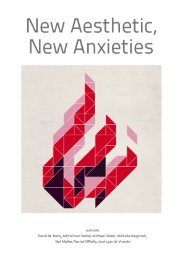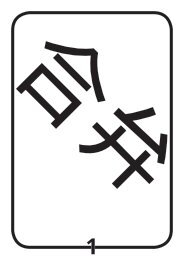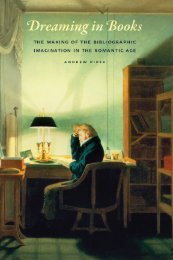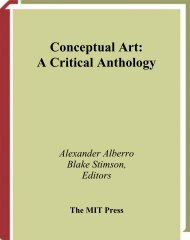Create successful ePaper yourself
Turn your PDF publications into a flip-book with our unique Google optimized e-Paper software.
unknown to Lenin, Stalin and Trotsky), except in the fulgurating bursts of poetry,<br />
painting and cinema at the very beginning of the Soviet revolution, or the motifs<br />
that Benjamin allowed as reasons for calling oneself a Marxist, or what Blanchot<br />
tried to bring across or propose (rather than signify) with the word<br />
'communism' ('Communism: that which excludes land excludes itself from]<br />
every community already constituted').' But again even this proposal in the final<br />
analysis went unrecognized, not only by 'real' communism, but also, on close<br />
inspection, by those singular 'communists' themselves, who were perhaps never<br />
able to recognize (until now at least) either where the metaphor (or the<br />
hyperbole) began and ended in the usage they made of the word, or, especially,<br />
what other trope - supposing it were necessary to change words - or what<br />
effacement of tropes might have been appropriate to reveal what haunted their<br />
use of the word 'communism',<br />
By the usage to which this word was put, they were able to communicate<br />
with a thinking of art, of literature, and of thought itself - other figures or other<br />
exigencies of ecstasy - but they were not truly able to communicate, explicitly<br />
and thematically (even if 'explicit' and 'thematic' are only very fragile categories<br />
here), with a thinking of community. Or rather, their communication with such<br />
a thinking has remained secret, or suspended.<br />
The ethics, the politics, the philosophies of community, when there were any<br />
(and there always are, even if they are reduced to chatter about fraternity or to<br />
laborious constructions around 'intersubjectivity'), have pursuecl their paths or<br />
their humanist dead ends without suspecting for an instant that these singular<br />
voices were speaking about community and were perhaps speaking about<br />
nothing else, without suspecting that what was taken for a 'literary' or 'aesthetic'<br />
experience was entrenched in the ordeal of community, was at grips with it. (Do<br />
we need to be reminded, to take a further example, what Barthes' first writings<br />
were about, and some of the later ones as well?)<br />
Subsequently, these same voices that were unable to communicate what.<br />
perhaps without knowing it, they were saying, were exploited - and covered up<br />
again - by clamorous declarations brandishing the flag of the 'cultural<br />
revolutions' and by all kinds of 'communist writing' or 'proletarian inscriptions'.<br />
The professionals of society saw in them (and not without reason, even if their<br />
view was shortsighted) nothing more than a bourgeois Parisian or Berliner form<br />
of Proletkult, or else merely the unconscious return of a 'republic of artists', the<br />
concept of which had been inaugurated two hundred years earlier by the Jena<br />
romantics. In one way or another, it was a matter of a simple, classical and<br />
dogmatic system of truth: an art: (or a thought) adequate to politics (to the form<br />
or the description of community), a politics adequate to art. The basic<br />
presupposition remained that of a community effectuating itself in the absolute<br />
5811THEORETICAi FRAMEWORKS








